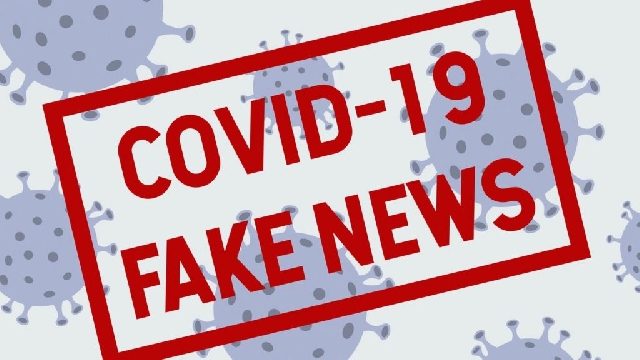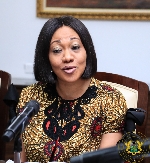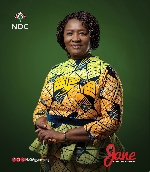Curbing the spread of COVID-19-related false info: Trends, tips for spotting ‘fake news’.
 COVID-19 fake news on the rise
COVID-19 fake news on the rise
Over the last few months, we have not only had to deal with a pandemic but also what the WHO calls an ‘infodemic’. Distilling from the avalanche of information to discern truth from falsehood has been a major headache for members of the public.
We wake up to see messages prefixed or suffixed – “Share this information with your family and loved ones”, “forward to as many people as you can” on the various social media platforms we subscribe to.
Since March this year when Ghana registered its index cases of Covid-19, the Dubawa team has come across several Covid-19 related messages, especially on social media platforms such as Facebook and WhatsApp.
Our verification and fact-checking of these messages have revealed similar results – the messages were either false or taken out of context. In fact, the majority of posts flagged to Dubawa by Facebook as part of its Third-Party Partnership, especially on Covid-19 remedies, which were verifiable were false.
We have also observed that Covid-19 false information flying around at a particular time is determined by current happenings or major events. Therefore, different types of false information circulated when there was no reported case when our indexes cases were reported, during the lockdown and now as schools have resumed.
For instance, information that circulated when Africa had not reported a case claimed Africans were immune to the virus because of the hot climate. The narrative, however, changed later when the continent registered cases.
Trend/ patterns of Covid-19 false information
We have noticed a trend in the kinds of Covid-19 related messages that have circulated on social media since the outbreak of the pandemic in the country. We categorise them into the following categories:
Denial of the existence of the disease in Ghana Purported Covid-19 cures or remedies Photos and videos taken out of context Financial/ Internet Scams Capitalisation on the pandemic to discredit political opponents Conspiracy theories Denial of the disease in Ghana
We saw when the disease started hitting other parts of the world, claims of African immunity and the inability of the virus to thrive on the continent on several social media platforms. Later when cases where registered, viral messages questioned its existence on the continent. Even when Ghana’s index cases were reported, old videos, of health officials denying the presence of the virus in the country when no case had been recorded, were resurrected to say there was really no case recorded.
Purported Covid-19 cures or remedies
While this was going on, purported remedies and cures for the virus also surfaced.
This is a major theme that keeps recurring but was more widespread at the beginning of the pandemic in Ghana – as has been the case in other countries.
And they keep resurfacing, sometimes with just a little tweak to them. It is therefore not surprising to see a claim which has been debunked in March reappear on social media months later.
The problem with some of these remedies is that people who share them do not necessarily agree on what they are supposed to be doing. So in one breath, we have seen messages which claim eating a bowl of freshly boiled garlic can cure Covid-19, others also say it can prevent the contraction of the disease.
We have also come across messages that say drinking alcohol (akpeteshie) can kill the virus that causes Covid-19. The logic behind this is that if using alcohol-based hand sanitizer will kill the virus, then drinking alcoholic beverages will do a much faster job.
This information is not only false but is also very dangerous as we have heard of instances in other parts of the world of people who have died from binging on alcohol after similar messages circulated in their countries.
About two months ago, sobolo (hibiscus tea) became very much sought after in parts of the country after a viral video claimed it had been used to treat and cure coronavirus in China. Ghanaians were therefore encouraged to do same.
Our verification process showed that none of the supporting documents mentioned by the claimant backed the claimed. In fact, one of the documents was about a study conducted in 2016 – when the world did not know about this new strain of coronavirus, Covid-19.
That particular study was about how some selected tea extracts, including hibiscus tea, has effects on H5N1 highly pathogenic avian influenza virus (HPAIV).
It is worth mentioning that, hibiscus tea, according to research, may be useful in treating viral infections. However, currently, there is no evidence it has been used to cure or can cure Covid-19.
Other remedies which have been popular on social media as preventive and curative remedies include the use of Dettol disinfectant, eating alkaline food such as oranges, steam bathing (apun), inhalation of steam, eating ginger, lemon, gargling with saline solution, drinking lots of water, having loads of sex, chloroquine and hydroxyl chloroquine, and recently a claim that people who have hair in their nostrils are unlikely to contract the disease.
Manipulated photos, Videos
Old photos and videos of events which happened prior to Covid-19 have reappeared online but with different captions implying they were incidents which happened during pandemic.
As mentioned earlier, these videos are tied to major events or happenings. Therefore, during the partial lockdown of parts of the country, several videos circulated of military brutalities, some of which later proved to be false.
In fact, one viral video which found its way into mainstream media and was part of the evening news bulletin on a major TV station, claimed law enforcement agencies in Zimbabwe used force to enforce lockdown directives. The government of Ghana was therefore urged to do same. The video in question, however, had nothing to do with the pandemic but was of an incident which had happened in 2019; Zimbabwe had not recorded a Covid-19 case at the time.
Photos of food distribution exercises also taken out of context abounded during the lockdown period. We found them to be unrelated to the Covid-19. Photos of a weeping Brazilian president was said to be of Italian president who had lost all hopes due to the havoc Covid-19 was wreaking in his country, Italians throwing away money because it had become useless to them all featured on social media. Again, these were old photos rehashed but with different narratives.
Financial/ Internet Scams
In the face of the economic hardships resulting from the pandemic, scammers also took advantage of the situation to dupe (or try to dupe) unsuspecting persons.
Melcom was said to have been giving out free vouchers; the WHO and phone manufacturing companies including Vivo, also running promos. Footballer Christiano Ronaldo was also purported to be giving out money to aid households impacted by the pandemic. And the Ghana Armed Forces undertaking ‘protocol’ recruitments.
Some of these claims had unsafe links which redirected people to other sites, while others proffered dubious instructions for getting involved in said promos.
These were all false as said parties involved denied were being that charitable.
Conspiracy theories
Conspiracy theories, on the origin of the virus and even it existence, were and are still viral.
One photo claimed the WHO said it was unsure the virus exists in the African continent.
Others claimed Bill Gates is behind the outbreak, that it was planned years ago as part of his goal to get the whole world vaccinated. Some also claimed President Barack Obama had warned Africans against being vaccinated as it was an attempt by ‘white people to kill Africans with their toxic vaccines’.
Political dimension
Another worrying trend we have observed was the capitalisation on the current situation by political actors to either make their candidates look good or to discredit political opponents. We have seen messages attributed to major political figures including the President, and his appointees, the former president and flagbearer of the opposition National Democratic Congress (NDC) and members of his party. In all cases when we verified, the claims were false.
For instance, in March, a Facebook post which was flagged to Dubawa as part of its Third-Party Partnership with Facebook claimed the former president, Mr John Mahama, had said he will not contribute his money, which is earmarked for his campaign, to the Covid-19 fight. This we found was false.
Another post flagged to us by Facebook in April said the President, Nana Akufo-Addo, had said he will resign from the presidency and withdraw from the December 7 elections if Ghana’s Covid-19 cases exceeded 500. This was debunked by the Director of Communications at the Presidency, Mr Eugene Arhin when contacted.
How can you verify information on Social Media?
With the avalanche of information members of the public are being bombarded with day in and day out, how can we distil truth from false information? How can we do this especially considering the fact while we are becoming adept and clever in discerning them, false information creators seem to be gaining the upper hand owing to the availability of sophisticated technology to aid them?
While it is sometimes difficult to authenticate information we receive on social media, there are a few things we can do to ensure we do not fall to them and inadvertently share false information we receive on these platforms.
The first thing to do is NOT to immediately share or forward messages without verification especially if they arouse in you strong emotions like fear and anger. It is sometimes a ploy by creators of false information to use you to gain traction. So VERIFY first.
Here are some tips to guide you:
Read beyond the headline: Unfortunately, headlines of some stories usually click baits, designed to get traffic unto a site which eventually translates into money for website owners. So read the entire content to get the full story. For instance, during the lockdown, we saw misleading headlines like this: A total lockdown will be imposed if Ghanaians fails to adhere – Oppong Nkrumah warns. And just over the weekend, another sensational headline ‘Mahama arrested for defiling three girls’. Without reading the entire story, one will go away with a totally wrong notion. Who is the source of the information? Pay attention to the ‘contact us’ or ‘about us’ section of the page to validate and verify content creators. Are they a credible source of information or is it just a satirical website?
On Facebook and other social media platforms, explore the account of the source to ascertain the kinds of information usually they usually share. Check the author: If it is a random message on social media, find out who the writer is. Are they credible and are they even real? Beware of messages from ‘a friend’s sister who works in a hospital’, ‘a doctor in China’ and the ubiquitous ‘Didier Raoult. Does the author mention their source of information? Are they passing on factual information or are they just expressing their opinion? Explore the supporting evidence: Click on hyperlinks embedded in messages and documents cited to determine if they actually support the claim being made – as Dubawa did with the claim that Sobolo was used to treat and cure coronavirus in China.
Check dates to be sure the message or information is not being used out of context: As has been exemplified from the very beginning of the pandemic in Ghana, old photos, videos and even textual content, unrelated to an event, can be rehashed during major crises. Pay attention to the writing, language and format: Sloppy writing characterised by grammatical and spelling mistakes is a sign that the message is likely false. Note that a press release or message from a government agency is unlikely to be informal or contain ‘slangs’. Pay close attention to the URLs: Many malicious news websites mimic authentic sites with slight modifications to URLs.
So we can have timeslive.co.za become t1meslive.co.za. Spot the difference? So a phoney or look-alike link may be an indication of false news. For content which is devoid of grammatical and spelling errors and some of the tell-tale sign of ‘fake news’ mentioned above, check out what other users are saying about the post. Read comments and questions left under the post – they may lead you to the truth. Videos and images are a bit tricky but still verifiable: look out for visual cues or details in the photo or video – for example, shadows, reflections, street names, weather, odd body parts, lip synchronisation. Also, check comments by other users; sometimes they lead us to the truth. You can also use simple digital tools such as Google Reverse image search and Invid to authenticate photos and videos, respectively. Verify with other credible news or information outlets or with fact-checking platforms: Google can also help with this – just copy and paste a portion of the message in the search engine and see what it churns out. You can ask for our assistance if you are unsure of information you receive. Contact us via WhatsApp: 0542 81 81 89, on Facebook @dubawa, Twitter @DubawaGh or via email @[email protected]. Alternatively, you can check our website, Ghana.dubawa.org for more.
In conclusion, fact-checking and verification is very crucial in these times. It also yields results. From our partnership with Facebook, we know that about 95 per cent of people who saw warning labels on posts which had been rated false by fact-checkers did not view the original content and therefore were not exposed to false information contained in them. Thus, when people are aware that the information they are about to consume is false, they avoid them.
Therefore, it is important to continue fact-checking and debunking false information to ensure members of the public, social media users especially, have access to factual and verified information.
We continue to count on the support of relevant bodies in this endeavour.
Source: classfmonline.com
Trending News

Ejisu: CPP seeks injunction to stop April 30 By-election
08:33
Murder of US national: Police arrest 2 at Assin Prasso
10:31
Lack of public purse protection ‘pathetic’ – Sam Jonah calls out ‘weaponisation of state agencies against opponents, assault on press freedom'
04:02
NDC to outdoor Prof Naana Opoku-Agyemang as running mate today
08:29
Movement for Change can evolve into a political party in the future: Kyerematen
13:20
Let's do away with 'slash and burn' politics- Adutwum
03:26
Submit 2023 audited financial statements by May – Akufo-Addo orders SOEs
07:48
Clear indication defeat staring NPP in the face - NDC
10:58
NPP sets up disability secretariat
02:46
Dismiss ECG, GWCL, GACL bosses over losses – United Voices for Change to gov’t
07:38



